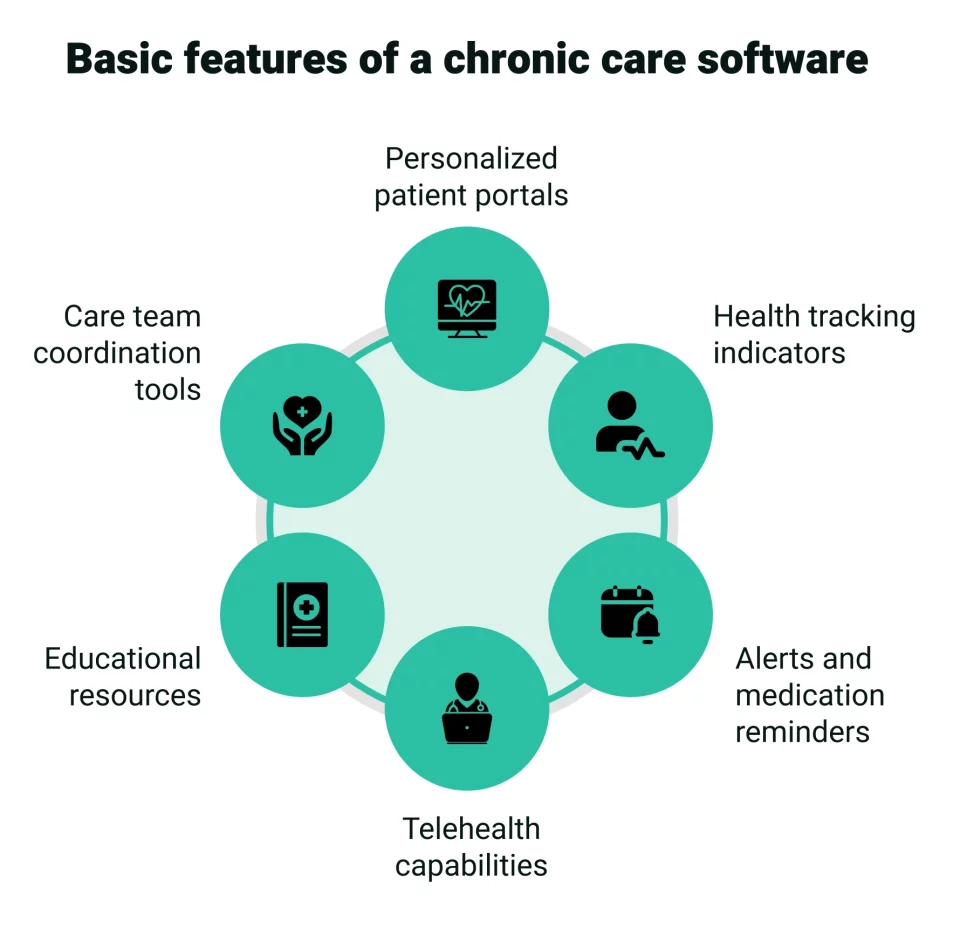INTRODUCTION
Learn about the software shaping the future of chronic care
Chronic diseases, such as diabetes, hypertension, and cardiovascular conditions, are among the leading causes of death and disability worldwide. Their prevalence continues to rise, placing an ever-growing burden on healthcare systems and demanding a proactive, patient-centric approach to management. The challenges associated with chronic disease care include continuous monitoring, personalized treatment plans, and effective communication between patients and healthcare providers. Addressing these complexities requires innovative tools that go beyond traditional approaches.
Custom healthcare software has emerged as a powerful solution, offering tailored tools to improve chronic disease management. Unlike generic systems, custom healthcare software solutions are designed to address the specific needs of healthcare providers and patients, integrating advanced features that support proactive care, enhance patient engagement, and optimize clinical workflows. These innovations enable healthcare organizations to deliver more efficient and effective care while empowering patients to manage their health actively.
One of the standout features of custom healthcare software is its ability to facilitate real-time monitoring and data analytics. Wearable devices, remote patient monitoring tools, and seamless integration with electronic health records (EHR) enable continuous tracking of vital health metrics. This real-time data provides actionable insights, allowing healthcare providers to detect early warning signs, adjust treatment plans promptly, and improve outcomes for chronic disease patients. These features create a sense of reassurance for patients, knowing their health is closely monitored even from the comfort of their homes.
Furthermore, custom healthcare software fosters patient engagement through intuitive user interfaces, educational resources, and personalized care plans. Features such as appointment reminders, medication tracking, and secure communication channels bridge the gap between patients and providers, creating a collaborative care experience. Innovations like AI-driven predictive analytics and decision support tools enhance the precision and efficiency of treatment, paving the way for a more dynamic and effective chronic disease management system.
IMPORTANCE
Innovative software solutions are reshaping patient care and outcomes
Traditional healthcare solutions often struggle to meet the complex demands of chronic disease management. Generic systems are designed with a one-size-fits-all approach, lacking the flexibility to address the unique challenges of different chronic conditions. These systems may not provide real-time monitoring, tailored treatment pathways, or comprehensive communication tools that patients with chronic diseases often require. As a result, patients may experience fragmented care, delayed interventions, and insufficient support for self-management. For healthcare providers, the inability to personalize care or seamlessly integrate data across platforms can lead to inefficiencies and missed opportunities for proactive intervention.
Custom healthcare software addresses these shortcomings by delivering tailored solutions that align with the specific needs of both patients and providers. Unlike off-the-shelf systems, custom software can incorporate disease-specific features such as tools for tracking glucose levels for diabetes patients, monitoring blood pressure for hypertension, or managing medication schedules for complex treatment regimens. These specialized functionalities improve care accuracy and ensure patients receive interventions precisely when needed. For providers, custom solutions facilitate better data integration, enabling a unified view of patient health and streamlining the decision-making process. This enhances both clinical efficiency and patient outcomes.
In addition to tailored functionalities, healthcare custom software development empowers patients through enhanced engagement and self-management tools. Features like user-friendly dashboards, educational content tailored to their condition, and secure communication channels enable patients to play an active role in their healthcare journey. Advanced capabilities such as predictive analytics and AI-driven insights allow providers to anticipate complications and implement preventative measures before issues escalate. By fostering a more collaborative and dynamic care model, custom software not only addresses the limitations of traditional solutions but also drives innovation in chronic disease management, ultimately improving the quality of life for patients and reducing the overall burden on healthcare systems.
Do you want to implement custom software solutions to revolutionize chronic disease management?
KEY FEATURES
Key healthcare software features are tackling the complexities of chronic disease
Effective chronic disease management requires tools that address the unique needs of patients and providers. Custom healthcare software offers tailored features to improve care delivery, enhance patient engagement, and streamline workflows. From personalized patient portals to predictive analytics and telehealth integration, these solutions empower healthcare teams to deliver data-driven care while helping patients take control of their health.
Personalized patient portals for chronic care
Patient portals are transformative in chronic disease management by centralizing and personalizing patient care. These portals enable patients to access tailored care plans designed specifically for their condition, ensuring their unique healthcare needs are consistently met. Features such as health reminders for appointments, medication schedules, and upcoming tests help patients stay on track, reducing the likelihood of missed care opportunities. Additionally, patient portal development services help provide easy access to a wealth of educational resources, empowering individuals to make informed decisions about their health and better understand their condition.
Self-management tools integrated into these portals further enhance patient autonomy. For instance, users can log and track symptoms, monitor medication adherence, and document lifestyle changes such as diet and exercise. These tools allow patients to see trends over time, providing valuable insights into how their behaviors impact their health. For healthcare providers, this data becomes a critical asset in assessing the effectiveness of care plans and making necessary adjustments. By facilitating active participation in their care journey, personalized patient portals foster a sense of empowerment and responsibility among patients.
The intuitive design of custom patient portals ensures ease of use, making healthcare more accessible for individuals of all ages and technical abilities. Secure communication channels built into these platforms directly link patients and healthcare providers, allowing timely responses to questions or concerns. This continuous engagement ensures that patients with chronic conditions receive the support they need when they need it, improving both patient satisfaction and long-term health outcomes.
Remote monitoring and real-time data collection
Custom healthcare software revolutionizes chronic disease management by seamlessly integrating wearable devices and IoT technology. These tools monitor vital health indicators such as blood glucose levels, blood pressure, and heart rate, delivering real-time data directly to healthcare providers. This constant stream of information enables a proactive approach to care, allowing providers to identify potential issues before they escalate into serious complications. Patients benefit from the convenience of continuous monitoring without the need for frequent clinic visits, enhancing their quality of life.
Real-time data collection ensures that healthcare providers stay informed about their patients’ conditions, even when they are outside clinical settings. For instance, a patient with diabetes can use a connected glucose monitor to transmit readings to their healthcare team automatically. The system can trigger alerts when anomalies are detected, prompting timely interventions such as medication adjustments or lifestyle recommendations. This level of oversight improves outcomes and fosters a stronger sense of trust and collaboration between patients and their care teams.
Beyond individual care, aggregated data from remote monitoring devices contributes to broader population health insights. Healthcare organizations can use this data to identify trends, measure the efficacy of interventions, and develop better strategies for managing chronic conditions on a larger scale. By leveraging these innovations, custom healthcare software bridges the gap between in-person care and remote management, enabling comprehensive support for patients at every stage of their journey.
Data analytics and predictive modeling
Predictive analytics and machine learning algorithms are game-changers in chronic disease management. Custom software development for healthcare leverages these technologies to analyze large volumes of patient data, identify risk factors, and predict potential complications. For example, patients with chronic obstructive pulmonary disease (COPD) can benefit from models that predict exacerbations, enabling early interventions to prevent hospitalizations. Similarly, in diabetes care, predictive algorithms can detect patterns that signal the likelihood of complications, prompting timely preventive measures.
By identifying trends and providing actionable insights, predictive modeling enhances healthcare providers' ability to deliver personalized and anticipatory care. These tools also empower clinicians to allocate resources more effectively, focusing on patients at the highest risk. Over time, this approach leads to improved clinical outcomes and reduced healthcare costs, as interventions can be implemented before conditions worsen.
Patients also benefit directly from the insights generated by predictive analytics. For instance, an app might notify users about behaviors or trends that could lead to health deterioration, such as skipped medications or missed exercise routines. By presenting this information in an accessible and actionable format, custom software ensures that patients have the tools to manage their health actively, fostering better adherence to care plans and improved long-term outcomes.
Automated alerts and medication reminders
Automated alerts and medication reminders are crucial in chronic disease management, addressing one of the most significant challenges: medication adherence. We design custom healthcare software that uses push notifications, SMS messages, and mobile alerts to ensure patients follow their prescribed schedules. We personalize these reminders to align with individual routines, minimizing the risk of missed doses and ensuring consistency in treatment.
Beyond medication adherence, automated alerts also notify patients about critical aspects of their care, such as upcoming appointments, the need to refill prescriptions, or significant changes in their health metrics. For example, a patient with hypertension might receive an alert if their blood pressure readings exceed a safe threshold, prompting immediate action or communication with their healthcare provider. This proactive engagement reduces the likelihood of complications and hospitalizations, improving overall patient safety.
These automated systems lighten the administrative burden for healthcare providers while ensuring better patient outcomes. Custom software can also provide analytics on adherence rates, enabling providers to identify patients needing additional support. By combining convenience, personalization, and precision, automated alerts and reminders enhance the overall effectiveness of chronic disease management systems.
Integrated telehealth capabilities for continuous care
Integrating telehealth capabilities into custom healthcare software significantly benefits patients managing chronic conditions. Virtual consultations and remote check-ups allow patients to access care from the comfort of their homes, eliminating barriers such as travel, scheduling conflicts, or physical mobility issues. This continuous access to care fosters a stronger relationship between patients and providers, improving the consistency of chronic disease management.
Telehealth-enabled software supports a range of features, from video consultations and secure messaging to virtual care plan updates. For instance, a patient experiencing early flare-up symptoms can connect with their provider for immediate advice or adjustments to their treatment plan. This level of responsiveness improves outcomes and reduces the stress and uncertainty that often accompany chronic conditions.
For providers, telehealth integration enhances workflow efficiency by enabling remote monitoring, streamlining follow-ups, and reducing the demand for in-person visits. With other features like real-time data collection and predictive analytics, telehealth capabilities create a holistic system for chronic disease management, ensuring patients receive comprehensive care at all times.
Care team coordination tools
Managing chronic diseases often involves a multidisciplinary approach, requiring seamless communication between various healthcare providers. Custom healthcare software includes care team coordination tools such as shared care plans, real-time notes, and secure messaging platforms. These features ensure that all members of a patient’s care team—whether primary care physicians, specialists, or therapists—have access to the same up-to-date information, improving the continuity and quality of care.
Shared care plans provide a centralized space for documenting treatment goals, progress, and next steps. For example, a patient with diabetes may have a care plan that outlines targets for blood sugar levels, dietary guidelines, and physical activity recommendations. By making this information accessible to all care team members, custom software eliminates redundancies, reduces errors, and ensures alignment in treatment approaches.
Secure messaging further enhances coordination by enabling real-time communication between providers. For instance, a cardiologist can instantly update a primary care physician about changes in a patient’s medication regimen, ensuring that adjustments are implemented seamlessly. By fostering collaboration and streamlining communication, care team coordination tools are pivotal in delivering integrated, patient-centered care for chronic disease management.

Here are the standard features to include in a chronic disease management software
INNOVATIONS
Transforming chronic disease management, one innovation at a time
Advancements in technology are transforming the landscape of chronic disease management, offering innovative solutions beyond traditional care methods. Custom healthcare software product development helps leverage cutting-edge tools like AI-powered virtual assistants, blockchain for secure data sharing, and natural language processing to provide smarter, more personalized care. These innovations improve patient outcomes and equip healthcare providers with the tools to deliver efficient and effective long-term care.
AI-powered virtual assistants
AI-driven virtual assistants are revolutionizing chronic disease management by offering 24/7 support tailored to patients' needs. These intelligent tools are constant companions, answering questions, providing medication reminders, and guiding patients through care routines. For instance, a virtual assistant for diabetes management can remind patients to check their blood sugar, suggest healthy meal options, or answer queries about symptoms in real-time. These assistants reduce the need for frequent clinic visits by addressing minor concerns that do not require in-person evaluation, allowing patients to feel supported while managing their condition from home.
Beyond convenience, AI-powered virtual assistants enhance patient engagement by fostering a continuous connection between patients and their healthcare journey. They can personalize interactions based on the patient's history, preferences, and health status, making the care experience feel tailored and dynamic. For healthcare providers, these tools are valuable extensions of their services, helping monitor patient adherence, flag potential issues, and provide actionable insights derived from patient interactions. By automating routine support tasks, AI virtual assistants free up providers' time for more complex care needs while empowering patients to manage their chronic conditions proactively.
Blockchain
Blockchain technology is transforming data management in chronic care by ensuring secure, transparent, and patient-controlled data sharing. For patients with chronic conditions, who often require care from multiple providers, secure data sharing is crucial for ensuring seamless transitions and avoiding redundant or conflicting treatments. Blockchain's decentralized architecture ensures that sensitive health data is stored tamper-proof, giving patients full control over who can access their information. This technology fosters trust between patients and providers, as all data exchanges are recorded and verifiable, reducing the risk of unauthorized access or data breaches.
In chronic disease management, where long-term tracking and frequent updates are essential, blockchain enables an integrated care experience. For example, a patient managing multiple conditions may need to share records between specialists, primary care physicians, and pharmacists. Blockchain ensures all parties access the most accurate and up-to-date information while maintaining patient privacy. Furthermore, it facilitates interoperability between healthcare systems, enabling different institutions to collaborate effectively. By enhancing security and streamlining data sharing, blockchain helps create a more cohesive and reliable care ecosystem for chronic disease patients.
Natural Language Processing (NLP)
Natural Language Processing (NLP) redefines chronic disease management by unlocking valuable insights from unstructured data sources such as patient-reported symptoms, clinical notes, and health surveys. NLP algorithms analyze this data to identify patterns, extract relevant details, and generate actionable insights. For instance, a patient’s description of fatigue or discomfort during an interaction can be processed by NLP tools to identify early warning signs of complications. Similarly, clinical notes from multiple providers can be synthesized to create a unified understanding of the patient's condition, enabling more precise care strategies.
For clinicians, NLP simplifies the complex task of understanding a patient's holistic health status. It can identify social determinants of health, such as housing instability or limited access to nutritious food, that may impact chronic disease outcomes. By providing a clearer picture of patient behavior, symptoms, and environmental factors, NLP empowers providers to deliver personalized and effective care plans. In addition, it enhances documentation efficiency, as providers can rely on NLP-powered tools to summarize patient interactions and automatically update records. This saves time and ensures that critical information is consistently incorporated into chronic disease management workflows.
OVERCOMING CHALLENGES
Unlock the power of custom software by addressing its biggest implementation hurdles
Implementing custom software for chronic disease management comes with several challenges, the foremost being integration with existing legacy systems. Many healthcare organizations rely on older technologies that may not seamlessly connect with modern software solutions. This lack of interoperability can lead to data silos, making it difficult to achieve a unified view of patient information. To address this, organizations must prioritize solutions designed with interoperability, such as those leveraging APIs or adopting standardized data exchange protocols like HL7 and FHIR. Collaborating with experienced software developers who understand the intricacies of healthcare IT can significantly smooth the integration process.
Another critical challenge is ensuring regulatory compliance. Healthcare software must adhere to stringent regulations like HIPAA, GDPR, and other regional standards to protect patient data and maintain trust. Non-compliance can lead to costly penalties and reputational damage. A custom healthcare software development company must stay up-to-date with regulatory requirements and integrate robust security measures, such as encryption, access controls, and regular audits, into the software’s architecture. Engaging developers with a track record in creating compliant healthcare solutions can provide confidence in meeting these requirements effectively.
Managing costs is also a significant hurdle, particularly for smaller healthcare organizations. Custom software development requires substantial initial investment, and organizations may worry about budget overruns or unclear ROI. To mitigate this, healthcare providers should partner with developers who offer transparent pricing models and phased implementation plans. Starting with a minimum viable product (MVP) that addresses the most pressing needs allows organizations to see tangible benefits early on and make informed decisions about further investment. Additionally, focusing on scalable solutions ensures that the software can grow alongside the organization’s needs, maximizing long-term value.
Finally, the human factor can present challenges in adoption and utilization. Resistance from staff due to unfamiliarity or perceived complexity may hinder the successful implementation of custom software. Comprehensive training programs, user-friendly design, and ongoing support are crucial to addressing this issue. Developers must prioritize intuitive interfaces and workflows tailored to the end user’s needs, while healthcare organizations should foster a culture of innovation and collaboration to encourage acceptance. By working closely with an experienced software development team, healthcare providers can overcome these challenges and harness the full potential of custom solutions for chronic disease management.
CONCLUSION
Smart healthcare software revolutionizes chronic care
Chronic disease management presents a complex challenge for healthcare providers, but custom healthcare software offers a practical pathway to address this pressing issue. Custom solutions can transform how chronic conditions are managed by leveraging personalized patient portals and engaging remote patient monitoring best practices along with predictive analytics and innovative tools like AI-driven virtual assistants and blockchain technology. These tailored features enhance patient engagement and self-management and empower healthcare teams to deliver proactive, data-driven care that improves outcomes and reduces the burden of long-term illnesses.
The continuous evolution of healthcare software underscores the importance of embracing innovative, patient-centric technologies. However, successful implementation requires overcoming system integration, compliance, and adoption challenges. By partnering with experienced software developers who understand the intricacies of healthcare IT, organizations can navigate these complexities and unlock the full potential of custom solutions. In doing so, they improve care for patients with chronic conditions and set a foundation for a more efficient, connected, and sustainable healthcare system.
People Also Ask (PAA) questions
- What is chronic disease management software?
Chronic disease management software is a specialized healthcare solution designed to help providers and patients monitor, manage, and treat long-term conditions like diabetes, heart disease, or COPD. It streamlines care through tools like patient portals, remote monitoring, and predictive analytics. - How does healthcare software support chronic disease management?
Healthcare software supports chronic disease management by providing real-time data tracking, personalized care plans, and enhanced communication between patients and care teams. It enables proactive management and early intervention to improve outcomes and reduce complications. - What are the essential features of chronic care management software?
Key features include personalized patient portals, remote monitoring capabilities, data analytics, predictive modeling, automated reminders, and telehealth integration. These tools ensure comprehensive and effective management of chronic conditions. - How does predictive analytics improve chronic disease outcomes?
Predictive analytics uses data to identify risk factors and anticipate disease progression, enabling early interventions. For example, it can predict exacerbations in COPD patients, allowing timely adjustments to care plans and reducing hospitalizations. - What role does telehealth play in chronic disease management?
Telehealth allows patients with chronic conditions to access virtual consultations, remote check-ups, and ongoing care without frequent clinic visits. It ensures continuity of care, enhances convenience and supports timely interventions. - What are the benefits of custom healthcare software for chronic conditions?
Custom software offers tailored solutions to meet specific patient and provider needs. Benefits include improved patient engagement, seamless integration with existing systems, scalability, and tools designed for specific conditions, enhancing overall care quality. - How can AI and machine learning help manage chronic diseases?
AI and machine learning enable personalized care by analyzing patient data to identify trends, predict complications, and recommend interventions. They also support virtual assistants for 24/7 guidance and medication adherence. - What are the challenges of implementing healthcare software for chronic care?
Challenges include integrating with legacy systems, ensuring regulatory compliance, managing costs, and training staff for adoption. Addressing these requires strategic planning and collaboration with experienced software developers.






